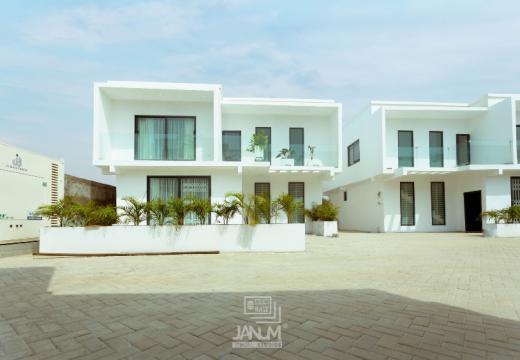Should You Invest In Affordable Housing In Ghana? The Pros And Cons
Should You Invest In Affordable Housing In Ghana? The Pros And Cons
- by PropHunt Admin
- On 03-02-2023
- at 12:24 PM

There are many benefits to investing in affordable houses in Ghana. It can have a significant payout should you decide to sell your property in the future and is a smart strategy to build a consistent rental income.
Everyone is considered to have a social and humanitarian need for housing. Therefore, through real estate investing in Ghana, affordable houses in Ghana create housing opportunities for low-to-middle-income households.
When it comes to making an investment in affordable housing, there are numerous myths. Some individuals might relate low-quality tenants and poorer profits to inexpensive housing. The fact is, any real estate investment can fit this description.
Continue reading to find out the history of affordable housing in Ghana, how to go about investing in it, and some drawbacks to keep an eye on your investment in affordable housing in Accra.
A brief history of affordable housing in Ghana
The history of affordable housing in Ghana can be traced back to the 1940s. At that time, the government began to build public housing to provide shelter for the poor. These developments were typically built in the suburbs of major cities, and they were often overcrowded and unsanitary.
In the early years of the nation, there was little to no affordable housing, and the majority of people who moved to cities for work found it challenging to house their families due to a lack of suitable housing. Affordable housing became increasingly necessary as the nation expanded, yet it was mostly out of reach for the majority of people.
The 1960s saw the establishment of the State Housing Corporation (SHC) which eventually started constructing the first low-income housing developments in Accra. These developments were designed to provide housing for people who earned less and were typically located in suburban areas, and they were generally well-maintained.
At the time the Ghanaian government began to implement a series of policies aimed to build more low-income housing developments. One of these policies was the creation of public housing, which was meant to provide affordable housing for the country’s citizens.
Read Also: The Best Mortgage Lenders For First-Time Homebuyers in Ghana
The government recognized Ghana's projected population growth and housing shortage and knew it would be needful to address in due course. Now Ghana has one of the world’s highest housing deficits of over 2 million housing units, with only one-third of the population residing in homes that meet global minimum standards.
The high cost of housing and the lack of access to land are two of the main reasons for the housing deficit in Ghana.
According to the World Bank, the cost of housing is a major barrier to economic development in Ghana. The high cost of housing makes it difficult for people to afford homes and start businesses. In addition, the high cost of housing often forces people to live in poverty, since they cannot afford to buy a home or rent an apartment.
Read Also: Affordable Housing Delivery in Ghana: Government Offers Free Land And Tax Incentives For Developers
Why Ghana's housing programs over the years failed
There are a few reasons why government affordable housing in Ghana over the years has failed. The reasons include a lack of funding, a lack of political will, and a lack of coordination.
1. Lack of continued funding
One of the main reasons why housing programs have not been successful in Ghana is because of a lack of continued funding. The government has not been able to provide the necessary funds to carry out the programs properly. This has led to a number of abandoned affordable houses in Ghana.
2. Lack of political will
Another reason why affordable housing programs have not been successful in Ghana is because of a lack of political will. There has been a lack of commitment on the part of the government to address the housing projects of previous governments whenever there is a change in government in the country.
3. Lack of coordination
A lack of coordination between housing programs can lead to failure. Housing Programs that need to be coordinated more often have different goals, strategies, and methods for reaching their target population. This can cause the programs to fail because they are not working together to reach their goals.
In addition, because the programs are not working together, they need to reach out to potential participants. This can make it difficult for the programs to find and recruit participants, and it can also make it difficult for the participants to find and use the programs.
4. Corruption
The main reason Ghana’s housing programs have been plagued with corruption is the high levels of bribery that are required to get approval for housing projects. This often leads to the misuse of government funds, which in turn undermines the overall effectiveness of the housing programs.
Why invest in affordable houses in Ghana?
Most of the houses in Ghana for sale are too expensive for the middle earners in the country. Thus, the government has called out to investors to prioritize affordable housing in Ghana for low-income households to own homes.
Income levels generally determine access to affordable estates in Ghana in relation to the neighborhood in which the property is located. Employment type, Age, or physical impairment, in addition to income, can make someone eligible for housing assistance.
There exist numerous investment opportunities in affordable housing in Ghana for sale. According to Ghana's ministry of works and housing, 60% of Ghanaians will require government assistance in the form of subsidies in order to own their own homes.
On the other hand, even with government assistance, 35% of Ghanaians are unable to purchase their own homes. This clearly indicates that home buyers in Ghana cannot afford the luxury houses developed in expensive neighborhoods like East Legon and Cantonments.
There is a big gap between the houses being produced and what the people can actually afford. The situation is precarious and the government is implementing policies to attract property investors into the affordable estates in Ghana.
How to invest in affordable housing in Accra?
If you’re interested in developing affordable housing in Accra and you’re not super experienced, It's wise to start small. Apply the knowledge you've gained from one property or circumstance to the next.
You can invest in affordable housing in Ghana without having to own a multi-unit structure. Your investment portfolio may include investments in affordable housing. Existing investors in real estate may participate in this opportunity.
1. Home developers: Many residential developers can embrace this laudable opportunity. You're not alone the government is also interested and has put in place incentives for affordable housing companies in Ghana. Home builders and developers can take advantage of these incentives and sell the property to other investors.
2. Buy cheap properties: The best way to begin is to find cheap properties in areas that have a lot of demand. These cheap properties would likely require maintenance. Experienced developers are more likely to be aware of this, but it's crucial to have contacts you can get in touch with to have the property inspected and to have the necessary repairs made.
In some instances, you'll have to demolish dilapidated properties and put up high-rise affordable apartments for low-income households. If you already own a rental property, you can convert it to affordable homes to help future tenants afford to live in your property.
3. Crowdfunding: This is a great way to become a passive investor in real estate in Ghana. This involves the practice of funding a real estate project by raising many small amounts of money from a large number of people. Real estate investing done in a passive manner involves making financial investments in homes without being responsible for their upkeep.
Pros and Cons of investing in affordable homes in Ghana
There are numerous advantages and some meager disadvantages to investing in affordable housing in Ghana, provided you do your research and make wise financial decisions you could build capital.
Pros
There are numerous advantages to investing in affordable housing in Ghana, provided you do your research and make wise financial decisions.
Government has interest
The government of Ghana supports affordable housing developments, which eliminates many potential risk elements in investing. The government made it plain that it intended to supply cheap housing across the nation in order to meet the housing needs of its citizens.
Rising demand
Due to population expansion, there is an ongoing demand for affordable housing in Ghana. Luxury real estate may appear like a more tempting investment to some, but it is more vulnerable to changes in the market. The demand for cheap housing may rise during an economic crisis while the desire for luxury homes may decline.
Profitability
The need for affordable housing in Ghana is prevalent. There is always a ready market for cheap houses for sale in Accra because of the escalating housing deficit in the country. You must understand how much you're investing and what your margin is, just like with any real estate investment.
Cons
There are unique factors that investors must take into account when it comes to affordable housing.
Costly To Build
The cost of building affordable housing is high, and the process can be difficult. Though it should be affordable the houses must be constructed to a higher standard than market-rate housing. This means that the construction process is more capital expensive.
Risky to undertake
The first is that it can be a risky proposition. If the market for affordable housing dries up, your investment may not be worth the trouble. Moreover, if the particular neighbourhood is not in high demand, it may be difficult to find affordable housing.
Summary
Affordable housing in Ghana presents an opportunity to invest in property with steady demand, whether you're a developer, landlord, or passive investor. Affordable housing has many advantages, however, there may be special considerations that must be given to developers and landlords.

 French
French




